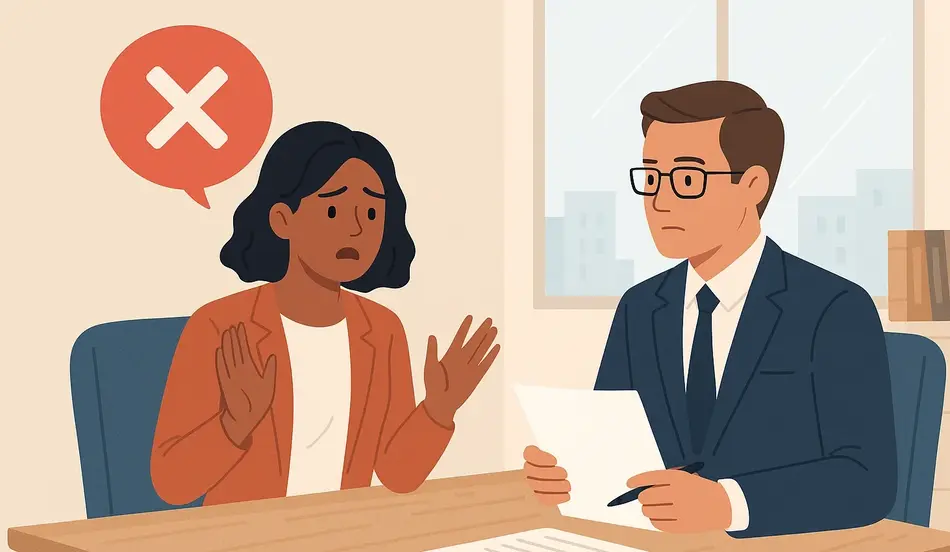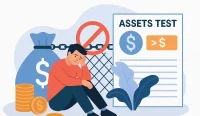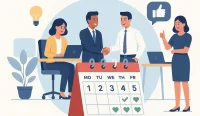Introduction
Job interviews are high-stakes situations where every word counts. Sometimes, even the most well-intentioned phrases can send the wrong message to interviewers, potentially costing you the job. In this post, we’ll break down five common phrases that can ruin your job interview, explain what interviewers actually hear versus what you mean, and provide better alternatives, practical tips, and career lessons. Read on for a real-world example and a comprehensive FAQ section to help you ace your next interview.
1. “I don’t have much experience, but…”
This phrase is often used by candidates trying to be honest or humble. However, it can unintentionally undermine your credibility and confidence.
What Interviewers Hear: “I’m not qualified for this job.”
What You Mean: “I’m eager to learn and willing to grow.”
- Better Alternative: “While I’m newer to this field, I’ve quickly learned [relevant skill] and am excited to apply my abilities here.”
- Practical Tip: Focus on your transferable skills and your ability to adapt.
Career Lesson: Confidence is key. Frame your experience as a strength, not a weakness.
2. “I’m a perfectionist.”
Many candidates use this phrase to answer the classic “What’s your weakness?” question, thinking it sounds positive. In reality, it’s a cliché that can backfire.
What Interviewers Hear: “I might be difficult to work with or slow to complete tasks.”
What You Mean: “I care about quality and pay attention to detail.”
- Better Alternative: “I set high standards for my work, but I’ve learned to balance quality with efficiency.”
- Practical Tip: Share a brief story about how you overcame perfectionism to meet a deadline or collaborate effectively.
Career Lesson: Employers value self-awareness and growth over rehearsed answers.
3. “I’ll do anything.”
Desperation is never attractive in an interview. This phrase can make you seem unfocused or lacking in direction.
What Interviewers Hear: “I don’t know what I want or where I fit.”
What You Mean: “I’m flexible and open to opportunities.”
Better Alternative: “I’m particularly interested in roles where I can use my skills in [specific area], but I’m open to learning new things.”
Practical Tip: Research the company and tailor your answer to their needs.
Career Lesson: Specificity shows you’ve done your homework and know your value.
Avoid Interview Mistakes — Hire Smarter
Job seekers can stumble with the wrong words, but employers face challenges too. The right hiring platform helps you connect with prepared, motivated candidates who know how to make the right impression. Post your job on WhatJobs today and find talent ready to succeed.
Post a Job Free for 30 Days →4. “My last boss was terrible.”
Speaking negatively about a previous employer is a major red flag for interviewers.
What Interviewers Hear: “I’m difficult to work with or might badmouth this company too.”
What You Mean: “I faced challenges in my last job and learned from them.”
- Better Alternative: “I learned a lot from my previous role, including how to handle challenging situations professionally.”
- Practical Tip: Focus on what you gained from the experience, not the negatives.
Career Lesson: Professionalism and discretion are highly valued in any workplace.
5. “I don’t have any questions.”
Ending an interview without questions signals a lack of interest or preparation.
What Interviewers Hear: “I’m not engaged or curious about this role.”
What You Mean: “You’ve covered everything, and I’m satisfied.”
Better Alternative: “Could you tell me more about the team I’d be working with?” or “What does success look like in this role?”
Practical Tip: Prepare 2-3 thoughtful questions in advance.
Career Lesson: Asking questions shows initiative and genuine interest.
Real-World Example
Consider Sarah, a recent graduate interviewing for a marketing assistant position. She started by saying, “I don’t have much experience, but I’m willing to learn.” The interviewer immediately questioned her readiness. In her next interview, Sarah reframed her answer: “While I’m new to the field, I’ve already completed two internships where I managed social media campaigns and learned to analyze engagement metrics. I’m excited to bring that experience here.” She got the job.
FAQ
Q: What’s the most important thing to avoid saying in an interview?
A: Avoid any phrase that undermines your confidence or badmouths previous employers. Focus on your strengths and what you’ve learned from past experiences.
Q: How can I prepare better answers to common interview questions?
A: Practice with a friend or mentor, and use the STAR method (Situation, Task, Action, Result) to structure your responses.
Q: Is it okay to admit you don’t know something in an interview?
A: Yes, but always follow up with how you would find the answer or your willingness to learn.
Q: How many questions should I ask at the end of an interview?
A: Aim for 2-3 thoughtful questions that show your interest in the company and role.
Conclusion
The words you choose in an interview can make or break your chances. By avoiding these five problematic phrases and using the alternatives and tips provided, you’ll present yourself as confident, professional, and ready for the next step in your career. Good luck!




